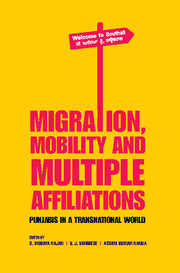Book contents
- Frontmatter
- Contents
- List of Tables and Figures
- Preface
- Acknowledgements
- Transnational World and Indian Punjab: Contemporary Issues
- Part I A Historical Survey
- Part II Shifting Contours of Migration
- 5 Ziddi Mundeh: Political Asylum, Transnational Movement and the Migrations of Men
- 6 Punjabi Illegal Migrants in France: Tales of Suffering, Invisibility and Marginalization
- 7 Migration as a Transnational Enterprise: Migrations from Eastern Punjab and the Question of Social Licitness
- Part III Social Structures and Organizational Links
- Part IV Education and Migration
- Part V Family Networks
- Contributors
- Index
5 - Ziddi Mundeh: Political Asylum, Transnational Movement and the Migrations of Men
from Part II - Shifting Contours of Migration
Published online by Cambridge University Press: 05 March 2016
- Frontmatter
- Contents
- List of Tables and Figures
- Preface
- Acknowledgements
- Transnational World and Indian Punjab: Contemporary Issues
- Part I A Historical Survey
- Part II Shifting Contours of Migration
- 5 Ziddi Mundeh: Political Asylum, Transnational Movement and the Migrations of Men
- 6 Punjabi Illegal Migrants in France: Tales of Suffering, Invisibility and Marginalization
- 7 Migration as a Transnational Enterprise: Migrations from Eastern Punjab and the Question of Social Licitness
- Part III Social Structures and Organizational Links
- Part IV Education and Migration
- Part V Family Networks
- Contributors
- Index
Summary
‘But the stranger that dwelleth with you shall be unto you as one born among you, and thou shalt love him as thyself; for ye were strangers in the land of Egypt’ (King James Bible: Leviticus 19:34)
‘Everyone has the right to freedom of movement and residence within the borders of each state. Everyone has the right to leave any country, including his own, and to return to his country. Everyone has the right to seek and to enjoy in other countries asylum from persecution’ Universal Declaration of Human Rights. Adopted by UN General Assembly Resolution 217A (III) of 10 December 1948. (Amnesty International, http://www.amnestyusa.org/human-rights/universal-declaration-of-human-rights, accessed 8 August 2010)
Introduction
The Bible and the Universal Declaration of Rights imagine a borderless world peopled by migrants who are welcomed, housed and sheltered. The idealism sounds naive in the twenty-first century where movement itself has become the subject of surveillance and imagined lines on maps are materially realized by barbed wire and armed border patrols. International airports signpost the segregation of passport holders from different segments of the globe; corral undesirable migrants from well-heeled or sought after tourists, while security procedures convey a clear message of fortress states, premised on exclusion. Despite the citadel mentality, ‘the closing years of the twentieth century and the beginning of the twenty-first (are) the age of migration’ (Castle and Miller, 1998, 3) marked by a 14 per cent increase in the number of migrants. Economic opportunity and family reunification continue to be primary reasons to migrate but almost 9 per cent of migrants are refugees and asylum seekers. This seemingly small statistic of 9 per cent dominates twenty-first century considerations of global movement and ‘asylum policies are now at the core of the discussions on migration in many parts of world’ (United Nations, 2002, 35). A consortium of nations have devised ways to blockade their borders, inventing new institutions along migrant routes to sift out ‘economic’ from ‘political’ migrants (Balibar, 2004; Benhabib, 2007; Derrida, 2001; Jain, 2007), a filtering process that deeply affects the experience of migration.
To address politically impelled migrations, an issue of contemporary significance, I move away from analysing the generalized aspects of migrant life and diaspora, and focus instead on asylum seekers as a special category of political migrant.
- Type
- Chapter
- Information
- Migration, Mobility and Multiple AffiliationsPunjabis in a Transnational World, pp. 133 - 155Publisher: Cambridge University PressPrint publication year: 2015



